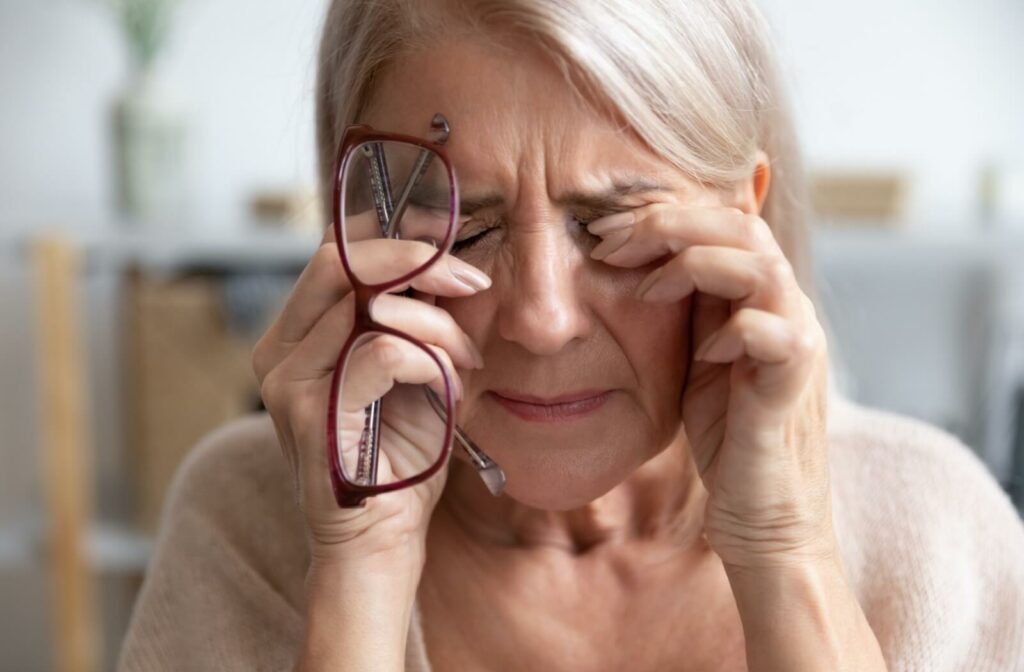Crying is a natural response—emotional or reflexive—but sometimes it’s paired with an uncomfortable burning sensation in your eyes. While it can feel alarming, this reaction is more common than you might think, and often has simple explanations rooted in how your tear film functions and reacts to different triggers.
Burning eyes when you cry can be caused by dry eye, irritants, allergies, or an imbalance in your tear composition.
Understanding the role of your tears and why they sometimes sting is key to finding comfort and protecting your eye health.
What Are Tears?
Tears may seem like nothing more than salty drops running down your cheeks, but they are incredibly complex! On average, a person produces between 15 and 30 gallons of tears every year. Tears are made up of water, electrolytes (salts), lipids (oils), and other nutrients that work together to keep your eyes healthy.
Layers of the Tear Film
Your tears create a protective layer called the tear film. This film consists of three layers:
- The oily layer: This outermost layer, produced by the meibomian glands, prevents tears from evaporating too quickly and creates a smooth surface for clear vision.
- The watery layer: The middle layer is primarily water with essential proteins and nutrients. It hydrates the eye, washes away debris, and delivers oxygen and nutrients.
- The mucous layer: Found closest to the eye, this layer spreads the tear film evenly and helps it stick to the cornea.
When these layers work together, your eyes feel hydrated and comfortable. If one or more layers are disrupted, you may experience irritation, which can cause a burning sensation.
Types of Tears
Tears form in response to different situations, and not all tears are the same. Understanding the different types of tears can shed some light on why your eyes may burn when you cry:
- Basal tears: These are your “everyday tears” that keep your eyes lubricated and protect them from harmful debris.
- Reflex tears: Triggered by irritants like smoke, dust, or cutting onions, reflex tears work to flush out these elements. Sometimes, they can cause your eyes to sting or burn as they clear the irritant.
- Emotional tears: These tears are produced in response to emotions like sadness or joy. They often come in higher volumes and contain additional hormones and proteins that may contribute to irritation.
Common Causes of Burning Eyes When Crying

When your tears sting, it’s often due to one or more common causes. Here are the most likely culprits of burning eyes:
Environmental Irritants
Your surrounding environment may play a significant role. When exposed to irritants like smoke, pollution, or dust, your lacrimal glands produce reflex tears to wash them away. While these tears help flush out harmful particles, the irritants themselves can cause a burning sensation.
If you’ve been outdoors on a windy day or near a smoky barbecue, you’ve likely noticed this effect firsthand. Once the irritant is removed, the stinging usually subsides.
Sweat
Have you ever had sweat drip into your eyes during a workout? That stinging burn is caused by sweat’s high sodium content. To make matters worse, sweat can carry skincare or cosmetics into your eyes, further irritating them. Reflex tears kick in to flush out these substances, leading to their own stinging cycle.
Dry Eye
One potential cause of burning eyes is dry eye syndrome, which occurs when your eyes don’t produce enough quality tears to keep them lubricated. This condition can lead to symptoms such as:
- Redness
- Blurry vision
- A scratchy or gritty sensation
Ironically, dry eye can trigger excessive tear production as your eyes try to compensate for the dryness. Unfortunately, if those tears are missing critical components (like the oily layer), they can’t do their job correctly, leading to irritation.
Blepharitis
When your eyelids become inflamed due to blepharitis, it can interfere with tear production. The meibomian glands, which produce the oil layer in your tears, may not function properly. Without enough oil, your tear film evaporates quickly, leaving your eyes feeling dry and irritated even when you’re crying.
Blepharitis is often caused by bacterial buildup around the eyelashes or skin conditions like rosacea. While it’s not contagious, it does require proper treatment to keep symptoms under control.
Eye Allergies
If you experience seasonal or environmental allergies, these could be the reason your eyes burn when you cry. Allergens like pollen, mold, dust mites, and pet dander can quickly inflame your eyes, causing redness, watering, and itching. When you cry, your emotional tears mix with allergen particles, which may increase irritation, especially if you rub your eyes.
Not sure if allergies are the cause? Eye allergies typically present alongside sneezing, congestion, or a runny nose, making them easier to identify.
How to Find Relief from Eye Discomfort
If crying leaves your eyes stinging, there are several remedies to relieve the discomfort:
- Warm or cool compress: Place a compress over your closed eyelids for a few minutes. This can reduce inflammation and provide soothing relief.
- Artificial tears: Over-the-counter lubricating drops can help keep your tear film balanced and relieve dryness or irritation.
- Avoid rubbing your eyes: Rubbing irritates the sensitive tissues around your eyes and can worsen redness and burning.
- Take breaks from screens: Prolonged screen use can contribute to dry eye. Use the 20-20-20 rule to give your eyes a break. Every 20 minutes, focus on something 20 feet away for 20 seconds.
- Stay hydrated: Drinking plenty of water ensures your eyes stay hydrated and produce quality tears.
If these steps don’t provide relief, you may need a professional evaluation. At Verona Vision Care, we know how frustrating burning eyes can be, and we’re here to help uncover the root cause. Whether it’s dry eye, allergies, or something else entirely, we’re committed to helping you feel better.
Questions About Eye Health? We’re Here for You
Crying is a natural and healthy way to process emotions, but burning eyes shouldn’t be part of the equation. From dry eye to environmental factors, there are many reasons why tears might sting. The good news is that solutions are available.
If you’re struggling with persistent irritation or discomfort, Verona Vision Care can help answer your questions and find the right treatment for you. Schedule an appointment today, and let us help you see and feel better.




